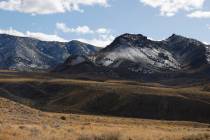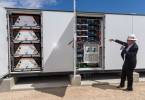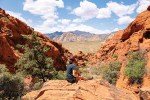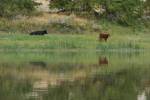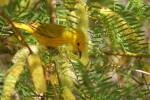Energy development poses challenge to wildlife habitat
As bird hunting season comes to an end and I reflect on all the wonderful hunting outings I've had this season and many seasons past, I'm reminded that Nevada's world-class big game and bird hunting is often the envy of hunters around the country.
We are truly blessed to be a part of this rich legacy. But sometimes we forget that our sporting heritage depends on the dedication of Nevada sportsmen, who are willing to work tirelessly, alongside state and federal agencies, and with our Legislature and elected federal representatives, to make sure our sporting traditions continue for future generations.
Today, Nevada sits at a crossroad with regard to our wildlife resources and the future of our sporting heritage. We are facing unprecedented threats to our wildlife, wildlife habitat and ultimately our sporting traditions. We are losing hundreds of thousands of acres of critical wildlife habitat every year to wildfire and invasive noxious weeds. Water resources are becoming scarcer and more impacted as humans' need for water grows and competes with wildlife. And now our wildlife resources are facing a new challenge -- the development of our state's tremendous renewable energy resources.
Nevada is poised to be at the epicenter of a new energy boom. Large-scale renewable energy developments have the potential to be a great benefit to our state, but they also could put important wildlife habitat at risk if not well-planned and properly sited. I strongly support renewable energy, but I am determined to see these projects developed in the right way and in the right places. Without careful planning and continued cooperation, a lot of the progress we have made improving our wildlife habitat will be threatened.
This month, officials from the Department of Interior and Department of Energy will conduct public meetings in Nevada in an effort to identify the "right places" for solar energy development on public lands. The DOI's recently released Programmatic Environmental Impact Study evaluates impacts that would result from the development of utility-scale solar energy projects on public lands in six Western states, including Nevada.
One of the alternatives laid out in the PEIS calls for siting all solar energy projects in Solar Energy Zones. These locations have been identified as areas which have high potential for energy production and the fewest impacts to water, wildlife and other natural resources. By choosing this alternative and concentrating future solar development in these productive zones, Nevada can develop new energy production, but do it in a way that protects critical wildlife habitat. I applaud this approach, but there is more work that needs to be done.
Proposed wind energy developments in Nevada also have the potential to be very disruptive and destructive to wildlife habitat. I would like to see federal agencies working with the Nevada Department of Wildlife, sportsmen's groups, wildlife conservation organizations and other stakeholders to review proposed wind energy developments throughout the state to help ensure these developments are also appropriately sited. We need to make sure proposed wind energy developments do not become the next big threat to our wildlife and sporting heritage.
Earlier this year, Secretary of the Interior Ken Salazar said: "We need to find a way of protecting habitat but also develop much-needed energy resources." He clearly understands that effectively balancing these two goals is vital to the future of our wildlife, our nation's economy and to Nevada's leadership and continued growth in developing renewable energy. We applaud Secretary Salazar for his work in this area. With careful planning, the responsible development of large-scale renewable projects can meet our demand for energy and preserve our hunting and fishing traditions.
We need leaders like Secretary Salazar to help us assure that energy developments in the West don't sacrifice our wildlife resources for short-term gain. We also can't forget that our sporting heritage depends on the continued dedication of Nevada's sportsmen.
It takes informed and engaged sportsmen, working with our state and federal agencies to make sure that our sporting traditions will continue for future generations.
Larry Johnson, of Reno, is president of the Coalition for Nevada's Wildlife. Founded in 1991, the organization works to protect and enhance wildlife resources in Nevada and to protect the heritage of sportsmen. For information on public meetings see http://solareis.anl.gov/involve/pubschedule/index.cfm












